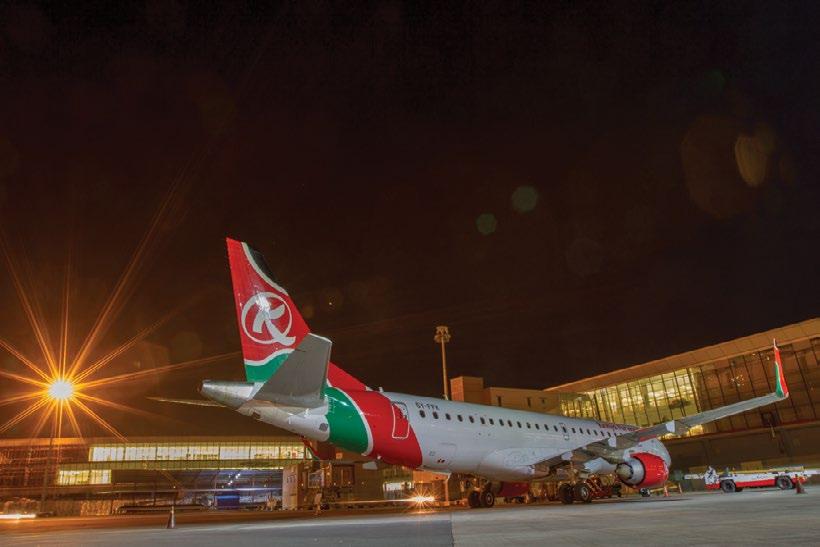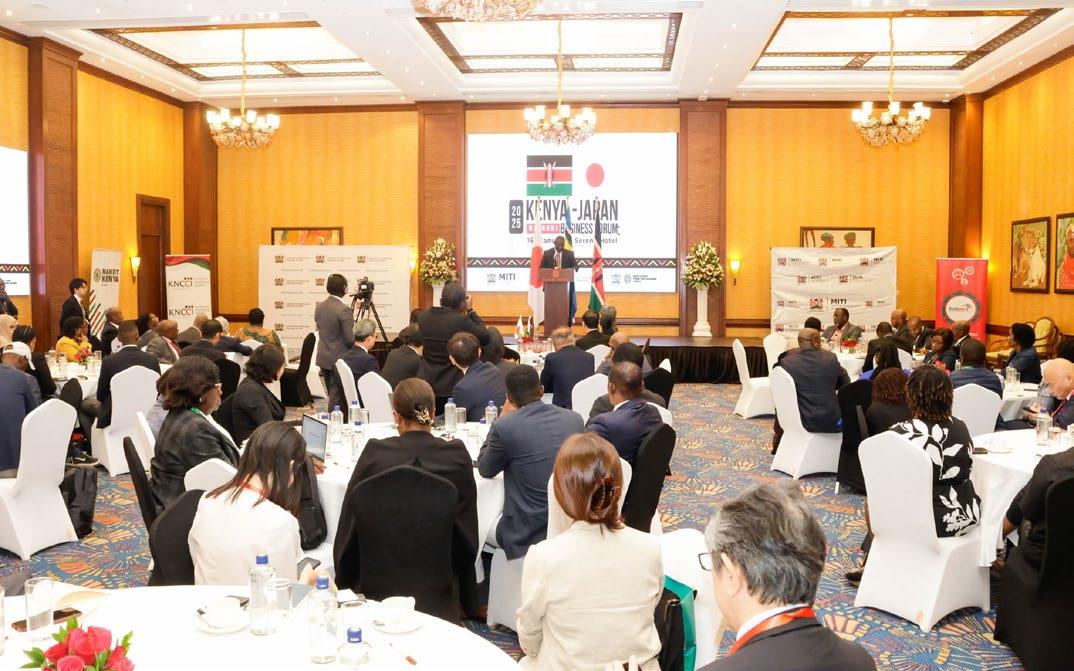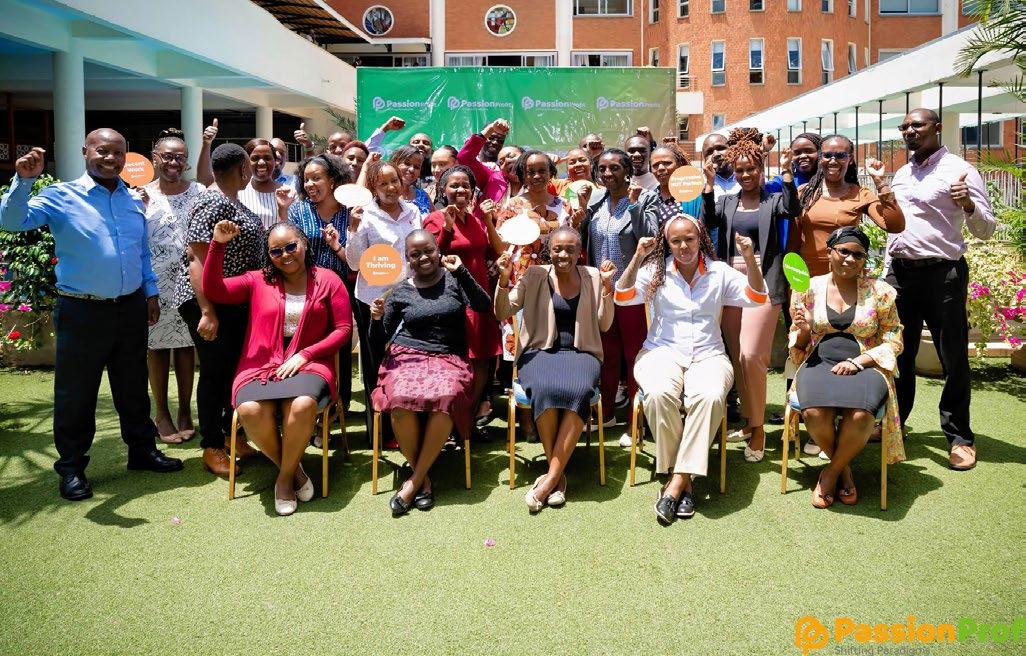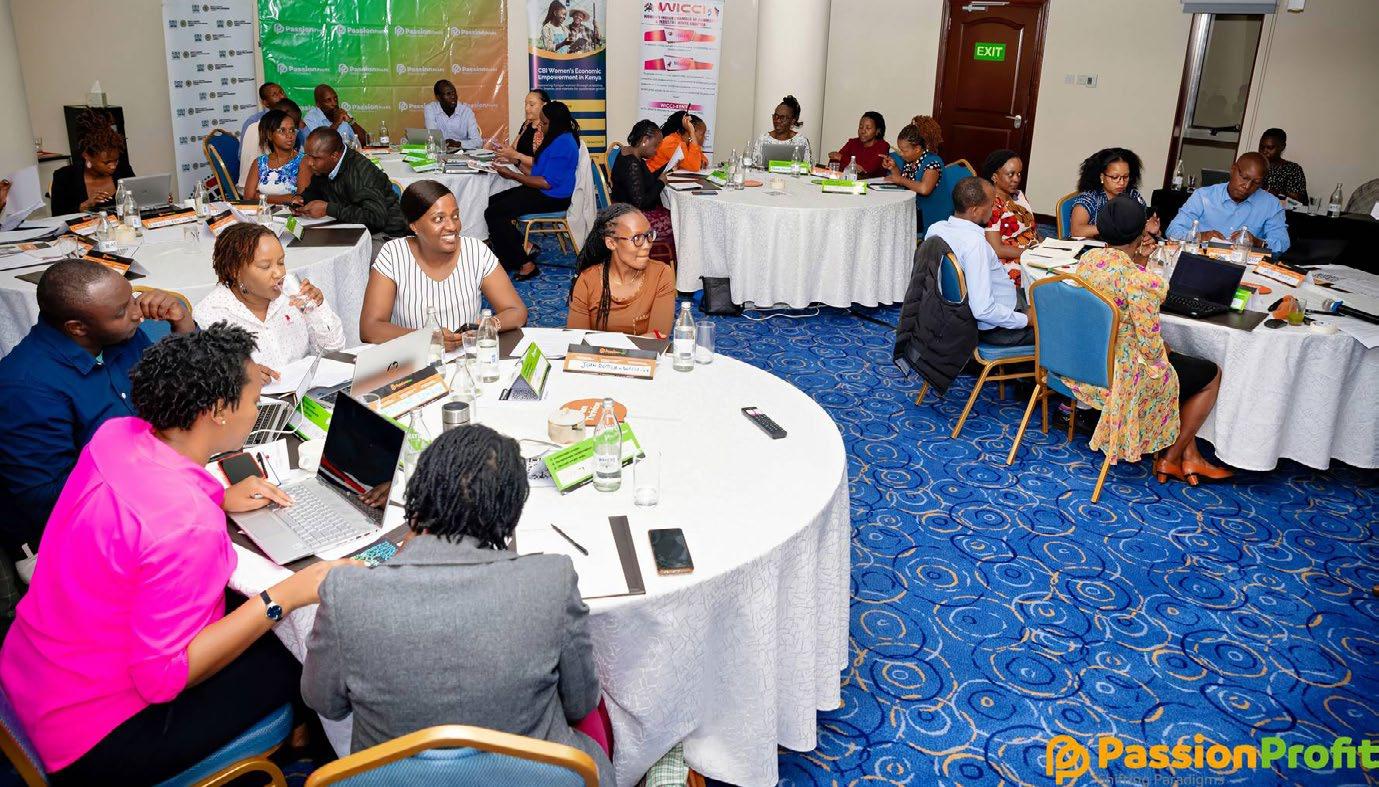
A publication by Kenya Export Promotion and Branding Agency






By Jonah Karanja: jkaranja@brand.ke
The Kenya Export Promotion and Branding Agency in collaboration with the Ministry of Investments, Trade and Industry hosted the Kenya-Japan Business Forum at the Serena Hotel in Nairobi on Thursday January 16, 2025.
The business forum hosted by the then Ag. Cabinet Secretary Ministry of Investments, Trade and Industry Hon. Salim Mvurya, alongside H.E Fuji Hiyasuki, State Minister for Foreign Affairs of Japan is one of the platforms that the country has successfully used to spur growth in trade, investment inflows and technology transfer to attain economic transformation in line with Kenya’s Bottom-Up Economic Transformation Agenda (BETA). A similar forum was held in Tokyo in February 2024 that brought together 40 private sector companies from Kenya and over 140 private sector companies from Japan to discuss business and investment opportunities.
During the inauguration of the forum in Nairobi, CS Mvurya, acknowledged the significant progress in the friendly relations between the two nations, highlighting Japan’s status as Kenya’s primary partner in development cooperation.
He emphasized that Kenya continues to be a vital exporter of agricultural goods to Japan, supplying items such as cut flowers and titanium ores, which collectively reached a value of $62.9 million according to the most recent trade statistics.
Japan’s dedication to the development of Kenya is evident through its ongoing

JANUARY 2025
KEPROBA hosts KenyaJapan business forum to boost trade and investments ahead of Osaka Expo 2025
Empowering women in exports: The CBI Women’s Economic Empowerment (WEE) project
Kenya takes bold steps to address European Union (EU) regulations on rose exports
Malengo na muktadha wa shirika la KEPROBA
The Power of Influencer Marketing in Exporting Kenyan Products
The customer service journey at the Kenya Export Promotion and Branding Agency
Crafting resolutions that work: Your guide to a successful 2025
Maureen Mambo- Editor -inChief
Mariam Maina - Editor
CONTRIBUTORS
Kellen Karuti
Molly Wambui
Irene Van De Graa
Jonah Karanja
Gertrude Mirobi
Janet Opiyo
Lilian Moraa
Samuel Njaaga - Layout
infrastructure initiatives, notably the Dongo Kundu Special Economic Zone in Mombasa, which is backed by the Japan International Cooperation Agency (JICA). The recent completion of the Dongo Kundu bypass represents a crucial achievement, facilitating enhanced industrial activity and attracting foreign investment.
“We are extremely pleased that the Japanese government has pledged to collaborate with us on the Dongo Kundu Special Economic Zone in Mombasa. I am aware that, through JICA, the Dongo Kundu bypass is now operational. Additionally, we have further commitments to develop additional infrastructure within the special economic zone,” he stated.
The Kenya Export Promotion and Branding Agency leveraged on the event to bring together over 100 Kenyan and 30 Japanese private sector companies representing a range of industries, including ICT, health, manufacturing, shipping and logistics, financial services, energy, construction, insurance, and agriculture. In addition to showcasing investment opportunities, this platform introduced the visiting Japanese

delegation to the incentives the Kenyan government is providing to entice foreign investment. The occasion also promoted significant government-to-business and business-to-business matchmaking, strengthening ties and cooperation between the two countries.
As the Agency that will spearhead Kenya’s participation in the upcoming Osaka Expo 2025, the Kenya Export Promotion and Branding Agency actively participated in the forums’ panel sessions with KEPROBA’s Stakeholder Engagement and Resource Mobilization Director, Ms Fatma Bashir presenting the opportunities that the private sector can expect at the EXPO OSAKA 2025 from 13th April to 13th October, 2025 while Product Development Manager, David Yamina led the Kenyan and Japanese business delegates through the Business Networking Session over lunch.
In his closing remarks, Principal Secretary State Department for Investments Promotion Mr. Abubakar Hassan, thanked the event organizers and reiterated his optimism for great business deals, ideas and opportunities that will pave way for more investments between Kenya and Japan.

By Irene Van De Graaf (irenev@brand.ke)
In a strategic move to bolster the participation of women in Kenya’s export sector, the Centre for the Promotion of Imports from Developing Countries (CBI), in partnership with Passion Profit, has initiated the Women’s Economic Empowerment (WEE) project. Spanning from 2021 to 2026, this initiative aims to address gender-specific barriers in international trade, fostering a more inclusive and equitable trading environment for women entrepreneurs.
KEPROBA, along with key trade support institutions such as the Kenya Trade Network Agency (KenTrade), the Organization of Women in International Trade-Kenya (OWIT-KE), the Fresh Produce Consortium of Kenya (FPCK), and the Horticultural Crops Directorate (HCD), plays a pivotal role in championing the WEE project in Kenya. These organizations have been selected for their expertise and commitment to advancing women’s participation in the export sector. Together, they work towards creating an environment where women-led businesses can flourish on the international stage, unlocking untapped potential within Kenya’s export market.
A central component of the WEE project is the GenderResponsive Trade Leadership course, which equips women entrepreneurs with essential skills for succeeding in international trade. This program focuses on fostering inclusive leadership and helping participants drive equity and diversity in decision-making within the trade sector. It offers practical guidance on designing and managing programs that address the unique challenges faced by women entrepreneurs, along with strategies for building strategic partnerships and securing resources to sustain their initiatives.
The course also helps participants navigate trade regulations, expand market access, and foster organizational adaptability to better support women exporters. Additionally, it emphasizes the importance of program evaluation to ensure continuous improvement and advocates for sustainable trade policies that prioritize equity and fair practices. Through these efforts, the course empowers women leaders to overcome barriers and contribute to a more inclusive, dynamic, and competitive export sector.
where they make up a significant portion of the workforce. In these sectors, women constitute between 65% and 75% of workers in cut flowers and over 75% in textiles.
Empowering more women to engage in exports allows Kenya to leverage their existing contributions to these industries and further stimulate economic growth. Studies have shown that increased international trade results in higher employment opportunities for women, with a notable rise in wages. For example, when a developing country doubles

Empowering women in the export sector brings significant economic benefits to Kenya. By addressing gender-specific barriers, the WEE project seeks to create decent jobs for women, promote female entrepreneurship, and enhance women’s representation in management roles. Although women are historically underrepresented in Kenya’s formal employment sector, they play a crucial role in export industries like cut flowers and textiles,
its manufacturing exports, women’s share of total manufacturing wages increases by an average of 5.8%, through higher salaries and expanded job opportunities. This highlights how initiatives like the WEE project can narrow the gender wage gap and promote greater economic equity.
The CBI Women’s Economic Empowerment project is a significant step towards achieving gender equality in Kenya’s export sector.
By providing women entrepreneurs with the tools and support they need to thrive in international trade, the initiative not only empowers individuals but also contributes to broader economic development.

KEPROBA, together with its partner organizations, plays a central role in driving this transformation. By championing initiatives that empower women exporters, these organizations are unlocking the untapped potential within Kenya’s export sector. This collective effort is fostering a more dynamic, inclusive, and resilient economy, one that is driven by innovation and sustainable growth. As more women enter the export market, Kenya stands to gain from increased revenue, job creation, and a more diversified and robust economic landscape.
Empowering women in exports is not just about breaking barriers; it’s about unlocking Kenya’s potential for inclusive economic growth and sustainable development.

By Kellen Karuti : Kkaruti@kephis.org
The floriculture industry is a key sector of Kenya’s economy, contributing significantly to foreign exchange earnings, employment creation, and agricultural growth. With roses making up 34% of Kenya’s flower exports to the (EU), maintaining market access is essential. However, the increasing threat of the False Codling Moth (Thaumatotibia leucotreta, FCM) has posed a significant challenge to this thriving industry.
The False Codling Moth is a quarantine pest native to SubSaharan Africa. It is highly destructive, with its larvae feeding on a wide range of crops, including fruits, vegetables, and flowers. In roses, it compromises the quality of cut flowers, leading to interceptions in international markets, especially in the EU. Since 2017, FCM has been classified as a regulated quarantine pest by the EU, meaning that strict measures are required to prevent its introduction through imports. Due to frequent interceptions of Kenyan rose exports, the EU has progressively heightened its inspection regimes. Sampling rates for Kenyan rose consignments have increased from 5% in 2020 to 25% as of May 2024. To address these concerns, the EU introduced Regulation (EU) 2024/2004, effective 26th April 2025, which mandates stringent pest management measures for roses exported to the EU.
Recognizing the urgency of the situation, Kenyan stakeholders, led by the Kenya Plant Health Inspectorate Service (KEPHIS), have developed the Rose False Codling Moth Systems Approach (Rose FCMSA). This protocol outlines comprehensive measures to prevent, detect, and control FCM at all stages of production, from pre- to postharvest. The protocol also aligns with EU requirements for a “systems approach,” ensuring that roses meet the zerotolerance threshold for FCM.
To validate this protocol, KEPHIS coordinated a consultative meeting held on 15th January 2025 at the Argyle Hotel, Nairobi. The event brought together key stakeholders, including flower farmers, exporters, Fresh Produce Exporters Association of Kenya (FPEAK) -FPC -Kenya, representatives from the Ministry of Agriculture and Livestock development, KEPROBA, AFA-Horticultural Crop Directorate and among other government agencies. This collaborative forum aimed to review the draft protocol and build consensus on its implementation.

Non-compliance with EU phytosanitary standards could result in the loss of Kenya’s position in the EU flower market, threatening livelihoods and revenue streams. With roses being a flagship export for Kenya’s floriculture industry, adhering to the EU’s stringent requirements is non-negotiable.
As KEPHIS Managing Director, Prof. Theophilus Mutui, noted during the meeting: “The situation we are in as a country can be referred to as a ‘catch-22.’ However, we are committed to making the tough decisions needed to maintain our place in the EU market and to safeguard the investments made in the floriculture industry.”
Following the validation of the Rose FCMSA protocol, KEPHIS will submit the final document to the EU for review and approval. If accepted, implementation will begin immediately to ensure Kenya is fully compliant by the 26th April 2025 deadline. This protocol represents a unified effort by all stakeholders to secure the future of Kenya’s rose exports and enhance safe trade.
Through these collaborative efforts, Kenya aims to maintain its reputation as a trusted supplier of high-quality roses while meeting the EU’s phytosanitary standards. KEPHIS remains at the forefront of driving compliance with international market requirements, ensuring the enhancement of safe trade and sustainability of Kenya’s floriculture industry.
Kellen Karuti is the Deputy Director Corporate Communications at Kenya Plant Health Inspectorate Service (KEPHIS)

Kutoa Elimu ya Biasharanje: KEPROBA hutoa mafunzo, ushauri na rasilimali husika kwa wazalishaji na wauzaji wa ndani ili kuwasaidia kufahamu ujumbe muhimu na mahitaji ya masoko ya Kimataifa. Hii inajumuisha uchambuzi wa soko, ushindani na fursa zilizopo ambayo huwasaidia wanabiashara kujiandaa vyema.
Kukuza Uuzaji wa Bidhaa za Kenya: Shirika la KEPROBA linalenga kuongeza mauzo ya bidhaa za Kenya kwa asilimia kumi kila mwaka ili kuboresha uchumi wa nchi. Isitoshe, shirika lilivumbua alama maalum ya utambulisho wa ‘MADE IN KENYA’ kuelezea ubora, uhalisia na kipekee cha bidhaa na huduma za nchi ya Kenya/ kutoka nchi ya Kenya. Pia, mtandao wa E- Comerce limewapa wanabiashara jukwaa la kidijitali kwa kuwaunganisha wauzaji wa Kenya na wanunuzi mbalimbali wa kimataifa.
Kukuza Ubunifu na Utafiti: Shirika husaidia wafanyabiashara kufanya utafiti wa soko ili kuelewa mahitaji na matakwa ya wateja. Hii inawasaidia kuboresha bidhaa zao ili ziweze kukidhi mahitaji ya soko. KEPROBA husisitiza na kuhamasisha wafanyabiashara kuhusu umuhimu wa ubunifu na utafiti
Na Janet Opiyo
Shirika la KEPROBA (Kenya Export Promotion and Branding Agency) lilianzishwa kwa malengo ya kuimarisha nchi ya Kenya na bidhaa zake katika masoko ya kimataifa. Shirika hili lina majukumu muhimu katika kukuza biashara, huduma na uchumi wa nchi . Makala haya yanaangazia malengo na muktadha wa shirika hili:
katika uundaji wa vifurushi vya bidhaa na uboreshaji wa bidhaa zilizopo ili kukidhi mahitaji ya soko.
KEPROBA husisitiza na kuhamasisha wafanyabiashara kuhusu umuhimu wa ubunifu na utafiti katika uundaji wa vifurushi vya bidhaa na uboreshaji wa bidhaa zilizopo ili kukidhi mahitaji ya soko.
Kuimarisha nembo ya MADE IN KENYA: Shirika la KEPROBA limejitolea mhanga kuhakikisha kuwa bidhaa za Kenya zina alama nzuri nchini na katika masoko ya kimataifa, hivyo kuongeza uaminifu wa bidhaa hizo. Kwa kuhamasisha kuunga mikono bidhaa za ndani, wanunuzi wamechangia kukuza uchumi wa nchi na pia kujenga utambulisho wa kitaifa. Hii imewapa Wakenya fahari ya kujivunia bidhaa za hadhi ya juu zinazozalishwa chini.
Chapa ya Taifa: KEPROBA hutoa miongozo ya chapa ya taifa kwa
minajili ya kuunda na kuimarisha picha chanya ya taifa la Kenya katika ngazi ya kimataifa. Chapa ya taifa husaidia katika kuunda utambulisho wa kipekee wa Kenya, ikijumuisha tamaduni, mila na urithi wa nchi. Pia, hulenga kuonyesha ubora wa bidhaa na huduma zinazotolewa na Kenya ikiwemo kilimo, utalii na sanaa. Kwa kuimarisha chapa ya taifa, Kenya inajenga uaminifu miongoni mwa wateja wa kimataifa wanaopendezwa na bidhaa kutoka nchi bora.
Chapa Huduma za Umma: KEPROBA hutoa mchakato wa kuunda na kuimarisha picha na sifa za taasisi. Hii inajumuisha nembo, rangi na ujumbe wa mawasiliano ambao unasaidia jamii kutambua na kuelewa huduma zinazotolewa. Chapa za huduma husaidia kuwasilisha dhamira na malengo ya taasisi na kuwafanya wananchi kuamini kwamba wanaweza kuwasiliana na taasisi hizo kwa urahisi.
Kwa ujumla , KEPROBA inachangia pakubwa katika ukuzaji wa uchumi wa Kenya kupitia uuzaji wa bidhaa, huduma na kuimarisha sifa za Kenya katika soko la Kimataifa.
By Gertrude Mirobi: gmirobi@brand.ke
Influencer marketing has emerged as a powerful tool for businesses aiming to expand their reach and access to international markets. For Kenyan exporters, this strategy offers immense potential to connect with global audiences, increase brand visibility, and boost sales for products that celebrate Kenya’s rich culture, heritage, and innovation.
At its core, influencer marketing entails collaborating with individuals who command significant followings on platforms like Instagram, YouTube, TikTok, or LinkedIn. These influencers have built trust with their audiences, making their endorsements highly effective for promoting products to specific markets.
By selecting the right influencers, designing engaging campaigns, and focusing on niche audiences, Kenyan exporters can cultivate brand loyalty, drive sales, and position Kenya as a leader in quality exports. Now is the time to harness this digital strategy— the world is eager to experience the uniqueness of products proudly Made in Kenya.
For Kenyan exporters, influencers can help amplify the visibility of products such as:
Handcrafted items (jewelry, home decor, traditional crafts)
Food and beverages (Kenyan tea, coffee, spices)
Fashion and textiles (African prints, upcycled clothing, footwear, leather)
Beauty products (natural skincare and haircare products)
1. Influencers can introduce your products to audiences who might never have encountered them. Their global reach allows Kenyan exporters to showcase the uniqueness of their products to specific markets.
2. Influencers’ content often feels more genuine than traditional advertising. Their ability to connect with their audience on a personal level ensures that product endorsements resonate well.
3. Influencer marketing is often more budget-friendly compared to traditional advertising, especially when partnering with micro-influencers who provide niche appeal at a lower cost.
4. Influencers can provide valuable feedback on audience preferences, helping exporters tailor their products to suit market demands.
1. Identify the right influencers
Research influencers whose followers align with your target market. For instance, a beauty brand exporting natural skincare products might partner with a YouTuber specializing in eco-friendly beauty.
2. Craft a compelling value proposition
Showcase what makes your product unique. Highlight its cultural significance, sustainability, or health benefits to appeal to both the influencer and their audience.
3. Collaborate on creative content
Allow influencers to use their creativity while promoting your product. Authentic and relatable content, such as unboxing videos, tutorials, or “dayin-the-life” features, can captivate audiences.
4. Engage with niche markets
Focus on micro-influencers who cater to specific interests, such as tea enthusiasts, eco-friendly fashion lovers, or cultural art collectors. Their smaller but loyal followings can yield higher engagement rates.
5. Monitor campaign performance
Use analytics tools to track the performance of influencer campaigns. Monitor metrics like engagement rates, website traffic, and sales conversions to assess ROI.
Several Kenyan brands have successfully leveraged influencer marketing to gain global recognition:
Kericho Gold Tea: Partnered with food and lifestyle influencers to promote premium tea blends, leading to increased sales and new distribution partnerships.
Sandstorm Kenya: Collaborated with travel influencers to showcase their luxury leather goods as essential travel accessories, gaining traction in international markets.
Cinnabar Green: Worked with beauty influencers to emphasize the natural ingredients in their skincare products, attracting ecoconscious consumers globally.
While influencer marketing offers immense potential, exporters should be mindful of challenges such as:
1. Finding genuine influencers with real and engaged followers.
2. Managing cultural differences to ensure campaigns resonate with international audiences.
3. Navigating costs, as top-tier influencers can demand high fees.
By Molly Wambui: MWambui@brand.ke
We see our customers as invited guests to a party, and we are the hosts.
It’s our job to make the customer experience a li le bit be er
JEFF BEZOS
The public service in Kenya is increasingly focused on fulfilling the needs and expectations of citizens. At the Kenya Export Promotion and Branding Agency (KEPROBA), the service experience is focused on delivering superior stakeholder satisfaction.
The Agency has two service points at the first and sixteenth floors of Anniversary Towers, University Way, Nairobi. The signage at the lobby area directs customers to the reception area where they are welcomed and directed to the relevant department.

The Trade Advisory Services department, which is situated on the first floor, gives expert advice on export procedures, country and product statistics, export potential and trade regulations among others. The information is sourced from reputable institutions around the world. We also provide information on request such as market intelligence, product tariff information and customized research. In addition to information, the Agency also provides services such as product design and development, export trade training, photography, video production and graphic design.
Customers can also make enquiries over the telephone and through the Agency’s social media platforms. We also have a dedicated email address (enquiries@brand.ke) for customer interactions. All queries raised are responded to in a timely manner.
KEPROBA has put in place a feedback platforms where customers give details of their experience. This information is used to continuously improve service delivery by identifying areas where services can be improved.
The Agency has a Citizen Service Delivery Charter that communicates its commitment to providing services as stipulated by its legal notice and other relevant documents. The service charter gives a comprehensive description of the services provided as well as the fees payable and timelines for each service. In case a customer is dissatisfied with their experience, the charter gives the avenues for addressing their concerns.
To know more about Kenya Export Promotion and Branding Agency’s services, please visit our website https://www. makeitkenya.go.ke/about-keproba/downloads/service-charter
By Lilian Moraa: Interncomm1@brand.ke
The beginning of a new year often comes with a sense of renewal and the desire to improve ourselves. As we prepare to step into 2025, setting new year resolutions is a popular tradition that helps people create goals for personal growth. However, many resolutions fail because they are either too vague, unrealistic, or lack proper planning. The key to success lies in setting goals that are achievable, measurable, and rooted in personal values. A realistic resolution not only enhances your sense of accomplishment but also builds longterm habits that stick. In this article, we explore practical steps to set meaningful and realistic resolutions.
in the very first place. Instead of “get fit,” make a specific determination such as what motivates you most-good health, more energy, or a desire to engage in those favorite activities. Linking your goal to a deeper purpose gives it personal significance and increases your commitment. Remember, resolutions that align with your values are more sustainable than those driven by external pressures. Take time to reflect on areas of your life that need improvement or hold potential for growth. When your resolutions come from a place of personal meaning, they become a source of inspiration rather than a burden.
motivated. Vague resolutions give too much room for procrastination and confusion. Breaking your resolution into smaller, actionable steps also makes it feel less overwhelming. Take, for instance, if you want to read more, begin with “read one book per month” rather than an ambiguous target like “read more books.” You will chart a more direct path to success when your resolutions are clear and specific
to do list
A realistic resolution not only enhances your sense of accomplishment but also builds long-term habits that stick.

Understanding the ‘why’ of achieving your resolutions marks the very first step toward setting realistic goals. Ask yourself what it means something to you, why this goal is so important, and most importantly, why you set the goal
A common reason resolutions fail is lack of specificity. Instead of saying, “I want to save money,” decide on a specific amount and a timeline, such as “I will save KES 5,000 each month for six months.” Specificity gives your goal a structure and makes it measurable. Also, with clear goals, tracking your progress becomes rather easy, which is an important way to keep yourself
While ambition is admirable, it is important to set goals that match your current capacity. Overly ambitious resolutions, such as “lose 30 kilograms in one month,” are a surefire way to set yourself up for failure and discouragement. Consider how much time you must devote to resources, and pre-existing commitments when setting your resolutions. Realistic goals do not mean low ambitions; they mean a balance between challenging and feasible. Remember, small consistent steps yield more lasting results than sudden unsustainable efforts. Celebrating small steps in progress can keep you motivated while avoiding burnout. When your goals are realistic, you’re more likely to stay on track throughout the year.
Life is unpredictable, and rigid
resolutions can be delayed in the face of unforeseen challenges. Build flexibility into your goals to accommodate life’s ups and downs. For example, if your resolution is to eat healthier, allow yourself occasional indulgences without guilt. Adaptability helps you maintain momentum when circumstances change. If you face setbacks, reassess your strategy and adjust instead of abandoning your resolution entirely. Flexibility also involves recognizing when a goal is no longer relevant and having the courage to shift focus. A resolution is not a contract, it is a guide to help you grow. Giving yourself grace while staying committed to your broader objectives fosters resilience and long-term success.

Even the best resolutions go to pieces without a plan. Create a step-by-step plan that details how you will reach your goals. If your resolution is to learn a new skill, identify resources, set aside specific times for practice, and track your improvements. Regularly reviewing your progress can help you stay accountable and motivated. Use tools like journals, apps, or spreadsheets to monitor your journey. Seeing tangible evidence of your efforts reinforces your commitment and boosts your confidence. However, tracking progress is not just about celebrating achievements; it is also a chance to identify what is not working and adjust accordingly. A structured approach bridges the gap between setting a resolution and achieving it.

It is easier to stick to resolutions when there is support
Resolutions are not about perfection they are about growth and improvement.
available. Share your goals with friends, family, or colleagues who can offer encouragement and accountability. For example, joining a running group or exercising with a friend can make it more enjoyable and make you more likely to stick to it. Having someone to check in with can help you stay committed during moments of doubt or temptation. If you are shy about sharing your resolutions, consider joining online communities or forums where like-minded individuals share their journeys. Support systems provide motivation, guidance, and a sense of camaraderie. Remember, you do not have to achieve your goals alone. Collaboration often leads to greater success and fulfillment.
Setting realistic new year resolutions for 2025 is about aligning your goals with your values, being specific, and crafting actionable plans. A successful resolution balances ambition with feasibility that includes room for flexibility. As you reflect on the year ahead, take the time to understand your motivations, embrace support systems, and celebrate progress along the way. Resolutions are not about perfection they are about growth and improvement. By following these steps, you can turn your aspirations into achievements and make 2025 a year of meaningful progress. Let this new year be an opportunity to build habits that enrich your life and bring you closer to your best self.


